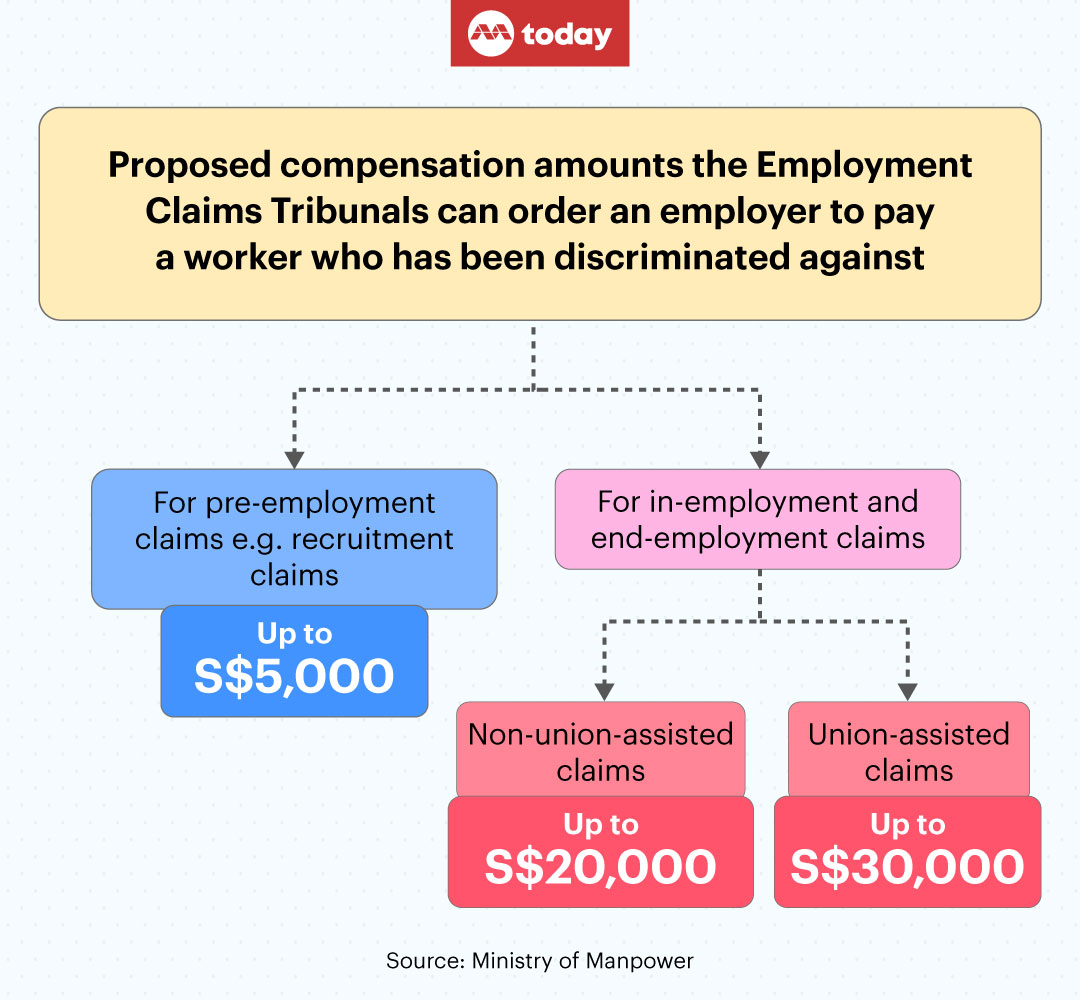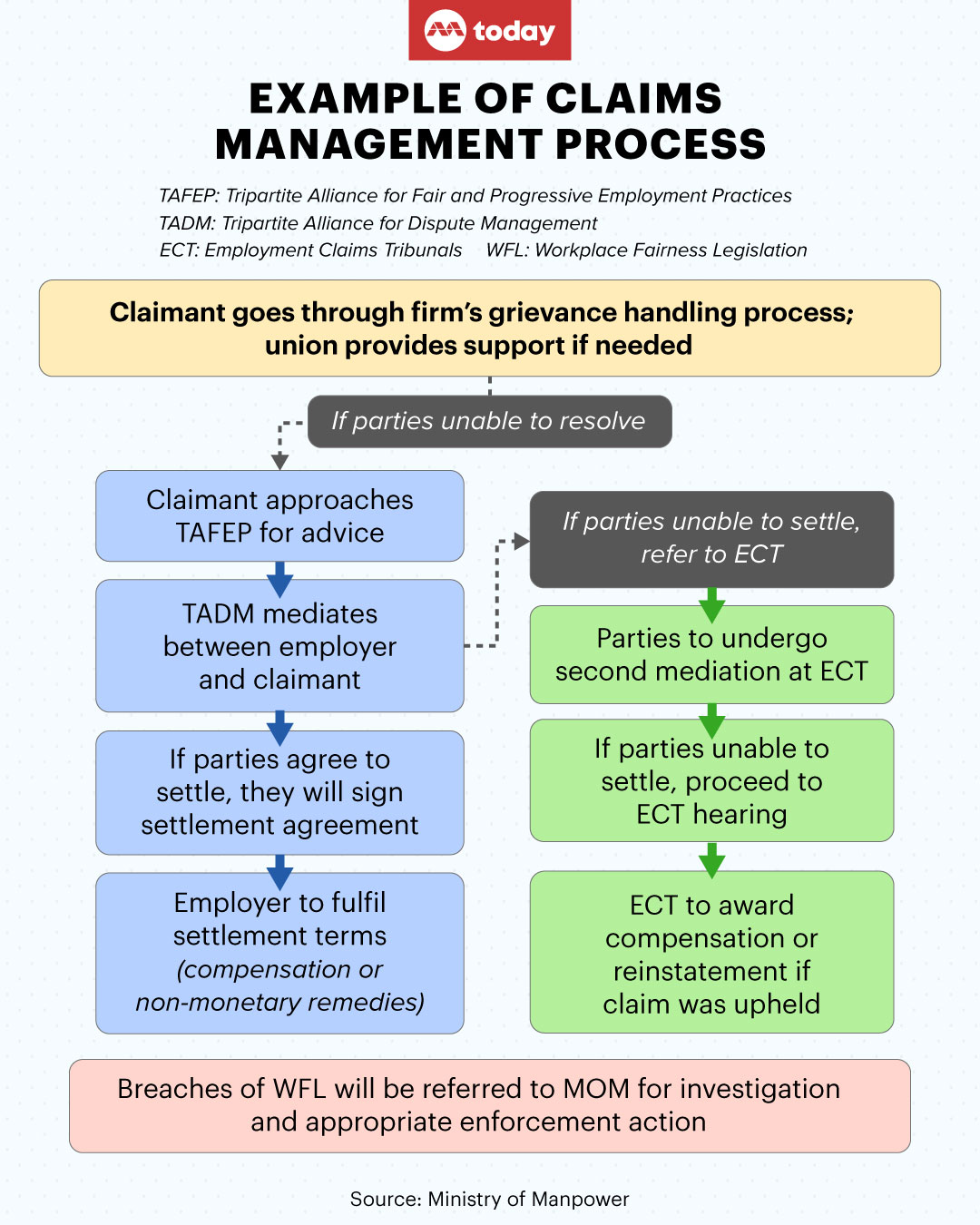Explainer: What is the process for discriminated workers to seek redress under a proposed framework?
SINGAPORE — As part of an interim report published on Monday (Feb 13), a committee that reviewed the framework for workplace fairness has recommended introducing legislation to protect workers who face discrimination.

Officer workers walking in the Central Business District of Singapore.
- A committee to review the framework for workplace fairness in Singapore has suggested strengthening the framework through legislation
- A worker who faces selected types of discrimination may turn to mediation with his employer at the Tripartite Alliance for Dispute Management
- If both parties reach a settlement, the worker may receive non-monetary remedies or monetary compensation
- If not, both parties can take their dispute to the Employment Claims Tribunals, where the worker can possibly claim up to S$30,000
- However, if there is insufficient evidence to prove discrimination, the worker could risk having his case struck out by the Employment Claims Tribunals
SINGAPORE — As part of an interim report published on Monday (Feb 13), a committee that reviewed the framework for workplace fairness has recommended introducing legislation to protect workers who face discrimination.
This includes helping workers seek legal redress for "common and familiar" types of workplace discrimination in Singapore under a new Workplace Fairness Legislation, the National Trades Union Congress (NTUC) said on Monday in in a joint statement with the Singapore National Employers Federation (SNEF) and the Ministry of Manpower (MOM)
The types of workplace discrimination covered under the recommended legislation are related to age, nationality, sex, marital status, pregnancy status, caregiving responsibilities, race, religion, language, disability and mental health conditions.
If the proposed Workplace Fairness Legislation is accepted and enshrined into law, it will apply to all stages of employment, from recruitment, to the period during employment such as promotions and performance appraisals, as well as to the end of employment such as dismissals.
TODAY looks at the process of claims if the new legislation is passed.
 WHAT HAPPENS IF A WORKER FACES DISCRIMINATION?
WHAT HAPPENS IF A WORKER FACES DISCRIMINATION?
If a worker faces workplace discrimination and is unable to resolve the matter with his employer through the company’s channels, he may turn to the Tripartite Alliance for Dispute Management (TADM).
There, both worker and employer will go through mediation.
If both parties agree to settle, they will sign a settlement agreement that may include both non-monetary remedies or monetary compensation as part of the settlement terms.
Non-monetary remedies include having the employer reinstate an employment offer or give an apology. The employer may also be committed to reconsider the worker for another job.
Throughout this process, unions may assist their members to resolve their grievances with their employers, file claims at TADM and represent their members during the mediation process to facilitate a settlement.
However, if both the worker and employer are unable to settle their dispute, they may refer their claim to the Employment Claims Tribunals, where they will undergo another compulsory mediation process.
If that fails, they will go through a hearing with the tribunal. The tribunal will award compensation or reinstatement if the claim is upheld.
At the same time, if the claim by the worker involves a suspected serious breach of the Workplace Fairness Legislation, the state may also conduct its own investigations and take enforcement action against the errant employer if necessary.
CASE EXAMPLE: AGE DISCRIMINATION
If a claimant in her 50s alleges that a tuition agency did not consider her for the role as a teacher due to her age, by specifically mentioning during the interview that they prefer younger candidates, she may approach the Tripartite Alliance for Fair and Progressive Employment Practices (Tafep) with the claim that she had been discriminated on the grounds of age during the recruitment.
If she is able to give evidence of discrimination, such as how the employer clearly indicated an age preference during the interview, the claimant and the tuition agency can undergo mediation at TADM.
If both parties agree to settle, they will sign a settlement agreement. For example, the settlement can involve having the employer agree to redo the interview for the worker, such as with a different interviewer.
However, if both parties are unable to settle, the claimant may refer the case to the Employment Claims Tribunals where they go through another round of mediation.
If that fails as well, the tribunal will conduct a hearing and award compensation accordingly.
If the claim is upheld, the tribunal can award a compensation amount of up to S$5,000 for pre-employment discrimination, such as recruitment claims.
It can also award a compensation amount of up to S$20,000 for non-union members and S$30,000 for union-assisted workers. These amounts are meant for workers who faced discrimination during the period of employment or at the end of their employment.
CASE EXAMPLE: INSUFFICIENT PROOF OF DISCRIMINATION
Claims without sufficient evidence and found to be frivolous could possibly result in costs for a worker.
For example, a claimant may allege that he was not offered a job due to his race and believes that his credentials and experience met the job requirements and the interview went well.
However, the claimant provides no evidence to suggest racial discrimination by the employer in the recruitment process.
In such a case, the claimant may approach Tafep, whereby Tafep will ask for evidence of discrimination.
However, if there is no evidence, Tafep will inform the claimant that the case is weak and could result in the case getting struck out by the Employment Claims Tribunals or even result in costs against the claimant.
If the claimant insists on filing a case, TADM will offer the employer the option to mediate first, or have the case fast-tracked to the tribunal.
If the tribunal decides that the case is frivolous, it may strike out the case, or at the application of the employer, order costs of up to S$5,000 against the claimant.









